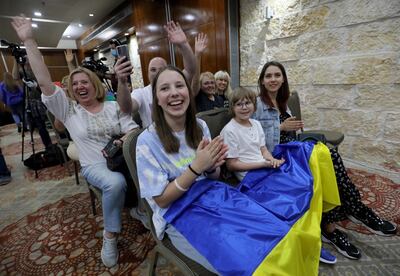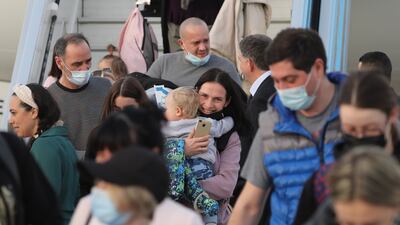Live updates: follow the latest news on Russia-Ukraine
At a seaside hotel in Netanya, Ukrainians repeat the unfamiliar sounds of Hebrew letters as they adjust to life in Israel.
There are about 120 Ukrainians at the Ramada Hotel, which stands metres from the shore, after fleeing the Russian invasion of their country.
“It doesn’t matter that we’re here, in safety. We have a lot of relatives, friends in Ukraine with their own families, some pets, that stayed in danger,” said Anna Montarento, 39, who escaped from the north-east city of Kharkiv.
About 20,000 Ukrainians have reached Israel since the war broke out on February 24, according to government figures. The UN has recorded more than 4.2 million refugees fleeing to other countries.
Ukrainians are currently allowed to travel to Israel only with prior approval, with most needing to prove personal ties to the country. Jews the world over are welcome to emigrate.
Ms Montarento has relatives in Israel and embarked on a multi-day journey when the conflict erupted, witnessing the horrifying results of Russian bombardments.
Her 17-year-old son did not want to leave.
“He wanted to stay and fight. I just grabbed him and forced him to travel, and now he has found friends here and he’s fine. He’s thinking about the future,” said Ms Montarento, who worked as a manager for a construction company.
Volunteers at the hotel from Alynu, an organisation supporting Jewish immigration, have organised children’s activities and a music night.
One of the Ukrainians said staff offer them more food at breakfast time than other guests.

Leonid Rubanovski, the managing director of a coffee factory in the capital Kyiv, described a fellow Ukrainian being sent by taxi, free of charge, to receive medical treatment.
“Every day something like that happens,” the 60-year-old said. “We feel like little children in a kindergarten that are being helped.”
The Ukrainians have been given a one-month stay at the hotel, funded by the government, during which they must organise their documents and find somewhere else to live.
Nicolai Manin, 30, who had a job in quality assurance in Kyiv, said they have been assigned a local co-ordinator to help make arrangements.
“I’m thinking of staying here. Because it’s a good country to live in, and we understand that the future, for the next several years, it could be difficult even to live in our country,” he said.
While Mr Manin said the Ukrainians are trying to support one another, they will face linguistic and financial hurdles.
Israel is the seventh most expensive country in the world in which to live, according to the Numbeo cost of living index, compared with Ukraine at number 121.
A volunteer said they are trying to help the guests find the most affordable accommodation, which will certainly not be in Netanya or urban hubs such as Tel Aviv.
Recalling his time in Kyiv, Mr Manin said it was like the “regular life of people who have freedom”.
“I went to the gym and spent time with my friends, for example, having a coffee on the bank of the Dnieper River,” which runs through the capital, he said.
Such cafe culture has been on the increase in Kyiv over the past decade, according to Mr Rubanovski.
“The quality of the coffee is wonderful,” he said.
“We love Ukraine,” Mr Rubanovski said. “We also love Israel, because it’s the country that let us in.”
While Israel has granted a limited number of Ukrainians entry since the outbreak of war, the country has not taken a firm stance on the conflict.
Prime Minister Naftali Bennett has styled himself as a potential mediator, travelling to Moscow last month for talks with Russian President Vladimir Putin.
Israel’s foreign minister, Yair Lapid, has taken a different approach. On Tuesday, he accused Russian forces of committing “war crimes against a defenceless civilian population” in Ukraine.
While the guests at the Ramada Hotel are trying to establish a new life, those they left behind in Ukraine are never far from their minds.
“Every morning and evening we are calling our friends, just to know that they are alive,” Ms Montarento said.
“It’s terrifying.”







































